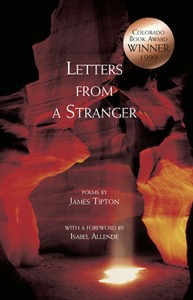 Click here to purchase.
Click here to purchase.
James Tipton is the world’s preeminent surrealist beekeeper. At his home on a high mesa near Grand Junction, Colorado, he bottles 10,000 pounds of honey each year, and writes poetry in the tradition of Neruda, Vallejo, Breton, Blake, and Robert Bly, extending the vision of a world that is simultaneously real and magical.
In Letters from a Stranger, Tipton’s first and long overdue full-length collection, each poem testifies to the bedrock of imagination. Taken together, the poems are extravagant yet earthy, tender yet passionate, wild yet intimate, crazy yet hopeful, and they describe how love can transform the world, renewing everything that is and calling forth everything that might be. It is a poetry of transformations, an invocation of exuberant vitality. As Tipton writes in “There are Rivers of Oranges”:
When we deeply imagine
we no longer imagine at all,
but dive, at last, naked and alive,
into the flesh of oranges, into
the steaming jungle, into words
that hang like orange rain,
like love just before it happens.
Tipton’s poetics, echoing Emerson, have led him to become “a master at following whims,” and the leaps of Tipton’s whimsical and profound metaphors are leaps of faith, bringing otherwise invisible or forgotten connections to light. As remarkable and surprising as they are, however, they are still manifestations of this world, flowers of a correspondence with Isabel Allende, who observes in the Foreword to the book that “these poems were written by a man who was born to write poetry.”
With a Foreword by Isabel Allende
Winner, Colorado Book Award
From the Foreword by Isabel Allende
“Jim Tipton’s poems have accompanied me like faithful nightingales in the long night that followed my daughter’s death. Now I am back on my feet. I have the will to live and the joy to write again. Now I can read Jim’s poetry with new delight, linger at the images, the magic and the language. I cherish these letters from a stranger that talk of ordinary experiences—wings, canyons, rocks, flesh—but mainly that other extraordinary experience…love. These poems are written by a man who was born to write poetry.”
Two poems
So Many Times I Have Felt the Sea Rising
So many times I have felt the sea rising
in my heart, when in my hands
I hold your letters, like singing nets of words
lifted out of some blue solitude for me alone.
So many times again I open your golden letters,
reading them to bees, to canyon walls,
to tiny lizards that dart like thoughts
through these deserts of perpetual loneliness.
So far away, so far, I felt, wanting to live at last
with only spirits, but oh, dueña del amor,
the feather I found, fallen from the angel’s wing,
means nothing to me now.
Those Evening When All of God’s Conundrums
Those evenings when all of God’s conundrums
arrive at once, I look for something solid,
like the cook, caught in the lick of thyme,
when she looks into her red soup, pondering
the interminable tomatoes of the past,
of like the old man in the cathedral in Cuzco,
muttering under his breath, “Jesus be damned,”
and the one good eye of the Pope too!”
These evenings when God’s conundrums arrive,
I remember the dead universities,
the knowledge that grew there like extra fingers,
until the hand was no longer able
to find a glove that fits against the cold;
I remember the words that fell like brilliant rain,
dazzling the dark out of the hair,
turning it this unruly and early white.
These evenings when all of god arrives at once—
conundrum and clumsy shepherd, three-personed and
inconclusive, like water filled to the brim with jugs—
He asks me whether I have any wool,
whether I have any weather left in me
to turn this drift of sail to land.
only one answer comes to hand:
“Yes Sir, yes Sir, three bags full.”
When all the evenings conundrum together
to this single lost star moment,
God gathers around me—and I stare,
with the intensity of the feeble minded,
at some gap that like some heavy iron passes
over these buttery cells, until even the very soul
seems to be only breakfast for some imbecilic chorus
“We’ll be together yet, mi campesina,” I sing,
while guns and conundrums bugle out God
to the winds not yet born, to the lazy hearts,
to the ladder of day, to the fetal angels,
to the distances that always repeat themselves,
to mouths that open like sockets of eyes,
to the delirious roses that bloom on the cheeks of love,
to the herds on high, the horse that swallowed the sea
That campesina conundrum is also not satisfying,
arriving like a country Madonna, a fixture on a tomb,
like gold faucets in the homes of the wealthy,
that campesina, that piece of break, that rosy God
always just out of reach, that benign and treacherous
presence that sighs out hope and the false peach
of future possibilities, that siren against which
I have hoarded the wax of bees.
These evenings when God’s arrival
all at once conundrums, what I lack
in purity of spiritual intention I compensate for
with purity of desperation; and some compensation,
unexpected, sets in, like the subdued pain in the ring finger
from the bite of the Black Widow six weeks ago;
like the soft ecstasy that is sinking into me now
while I sip this delicate tea of mangoes and marigolds
I received today in the mail from a stranger.
Praise for Letters from a Stranger
“Truly a pure and beautiful voice, a light. What a beautiful poet Tipton is, what new ways he shows the soul, just when we think it had no place else to go…When I say he breaks open the heart it come from finding something I didn’t even know I had lost. I carry these poems with me.”—Grace Cavalieri
“James Tipton writes a spare, deeply disturbing, indeed shocking poetry, which never descends to the soft option of the current degraded language and scatographics of those who affect candour these days—thereby showing how much he honours the language and respects himself and most of all, us, his readers and beneficiaries.”—Arcangelo Riffis
“Tipton’s poems are a great celebration—lovely & lush, just what we need as antidote to the pared-down self-pity that seems to be the going thing.”—Conrad Hilberry
“James Tipton’s poetry fuses Neruda and Whitman, and adds something new and sensual too: a fragrance of desert honey. And his poetry sings, soft but strong, to the souls of women. Every woman would love to be loved in the way Tipton loves.”—Michelle Lovric
Reviews
“Tipton’s images are strong and striking, yet tender and at times more delicate than the proverbial butterfly’s wing. The author is keenly, joyously alive; his almost painfully sharp powers of observation cut most deeply when he reveals the wondrous in the commonplace, recalling mica “that flaked like the pages of angels,” or a cat “who dances off the bed…to go outside and hunt the day.”—Lynda La Rocca, Colorado Central Magazine
“The poetry of James Tipton…is unique, engaging, splendidly crafter, and enduringly memorable.”—The Midwest Book Review
“He smoothly fits the abstract and the concrete together, as if they were old friends. Tipton is an author who speaks to our hearts and can be enjoyed by all.”—Peter Thorpe, Rocky Mountain News
About the author
James Tipton is widely published, including credits in The Nation, South Dakota Review, Southern Humanities Review, The Greensboro Review, Esquire, Field, andAmerican Literary Review, and also in various anthologies and other works including Aphrodite by Isabel Allende (1998), and Bleeding Hearts, edited by Michelle Lovric (1998). He is currently at work on two other volumes of poetry, The Alphabet of Longing and No Thoroughfare Canyon.







